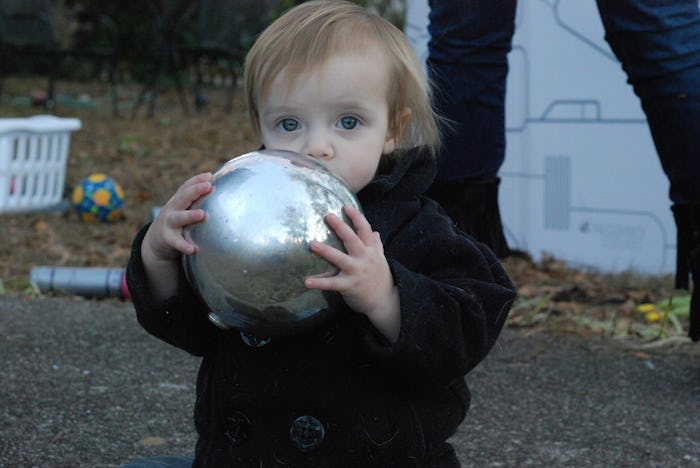Life

Sorry, But I Don't Think We Should Teach Our Kids About Santa Claus
Growing up, I always hated Santa Claus. For me, Santa was never about the magic of Christmas, so much as he represented my family's guilt trips. Come Thanksgiving, I’d start hearing it from my parents, my aunt, and my grandparents: "If you don’t behave, Santa is going to bring you nothing but coal!" They'd joke about it so often that I actually believed them. Santa was always watching my behavior, everyone constantly reminded me. He saw me when I was sleeping, and he knew when I was awake. So when “Santa Claus is Comin’ to Town” came on the radio, I felt nothing but boiling resentment.
Of course, there were always tons of presents under the Christmas tree, though I did get pretend coal in my stocking once (and wondered for weeks what I’d done to deserve it). My relatives had successfully convinced me that my worth, as determined by presents, depended on my behavior.
For this reason, I always hated Santa Claus, and when I had kids my husband and I decided we wouldn't raise our children to believe in him. When they were about 2 years old, we told them all the presents under the tree were from mama and daddy, and that was that. We never caved, so my kids never believed in Santa Claus. And I couldn’t be happier about it.
Whenever I remind people that Santa’s a lie, I’m accused of being a Grinch. I’m taking the magic out of Christmas. Childhood is a time for believing in magic! But I believe in telling children the truth. After all, I don’t encourage my kids to believe in fairies, nor do I try to convince them that they could actually go to Hogwarts. So why would I teach them that Santa is real?
My parents had expended so much energy convincing me this dude in a red suit was real, I thought. If the whole world would go to that much trouble to lie about Santa, I wondered what else they were lying about.
Childhood is a time for imagination. It’s a time for playing pretend. But it’s not up to adults to provide the framework for that play. When we enact the Santa ruse, we lie to our kids, no matter how benign we might think that lie is. And clearly, it's not that benign: I was one of those kids who ended up finding out Santa Claus wasn't real when I found the Christmas presents stashed in the downstairs closet, and I remember feeling somewhat traumatized. My parents had expended so much energy convincing me this dude in a red suit was real, I thought. If the whole world would go to that much trouble to lie about Santa, I wondered what else they were lying about.
Honestly, I see Santa as the avatar of commercialized Christmas. We’re Catholic, and we wanted to teach our kids the religious significance of Christmas. Santa just seems like a needless intrusion on our holiday. I feel that the focus on Santa is a focus on the accumulation of material wealth and the great American desire for more, more, more. I mean, his sole function is to deliver presents, not to teach children about, say, the importance of recycling or donating to UNICEF.
Teaching kids about Santa also encourages them to be greedy. It’s easy to whine and ask for more presents when you think mom and dad aren’t buying them. So I want my kids to know who put the presents under the tree, and what they had to do to put them there. I don’t want my kids to fall to their knees and shower us with gratitude for the presents we give them, but I want them to know we can buy them because we worked for the money to do so. It’s basic economics, and teaches them early on that money doesn’t come out of thin air (or, for that matter, out of a magical sleigh that lands on the roof and comes through the fireplace).
I want my kids to know who put the presents under the tree, and what they had to do to put them there.
As my kids got older, we did have to explain the concept of Santa a bit more to them. We told them that Santa is an elaborate game of pretend that people play, and some people really, really, really like to pretend it’s real, so it’s mean to tell them otherwise. But even though you shouldn't tell your friends that Santa isn't real, we don’t pretend Santa in our house.
As much as I dislike the Santa game, I don’t want to ruin someone else’s Christmas. I don’t want my kids to be those kids who tell everyone on the playground that their parents are really Santa. I respect that Santa is an important part of Christmas for many families, and it's their right to tell their kids whatever they want. But for many reasons, it’s not for us. Call me a Grinch. Call me a Scrooge. But don’t call me a believer.